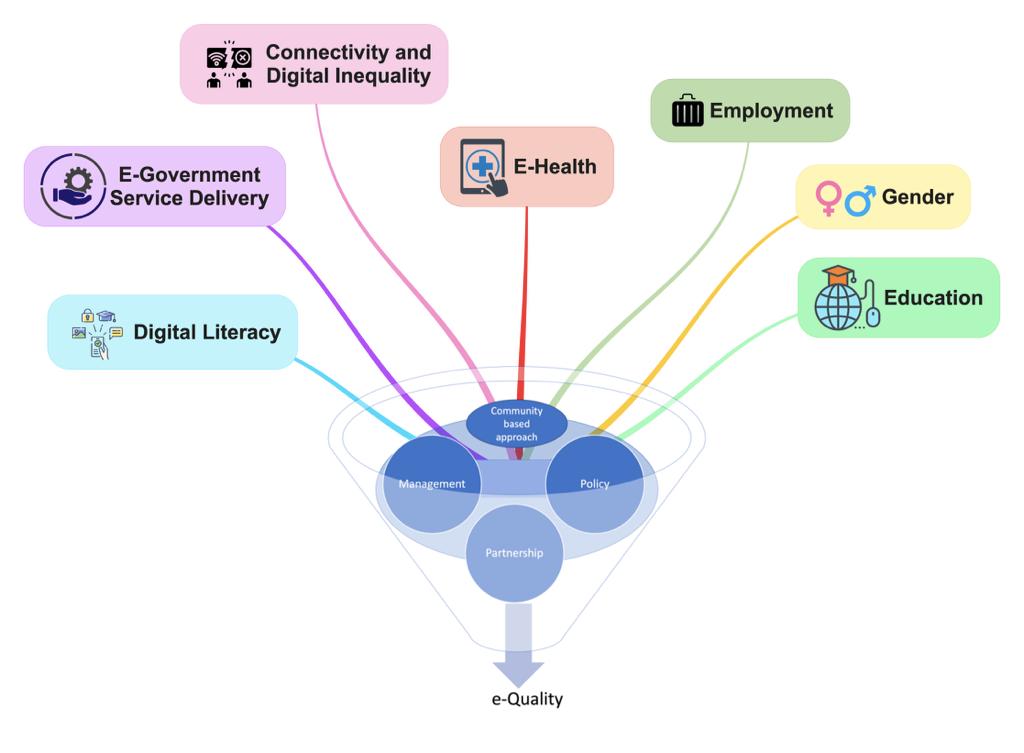23 December, 2023
Bangladesh’s visionary approach to lead world with ‘Zero Digital Divide’
Source: BSS Nnews
The sweeping tide of digital revolution has lifted many to unprecedented heights – but not all, and not to the same extent. No doubt, significant progress has been made in terms of the expansion of the quantity of digital services. However, there is no automatic link between digital expansion and digital inclusion. That linkage has to be established through policies and institutions.
For example, the existing measure of internet access—online versus offline—greatly overestimates how many people across the globe are digitally included. The COVID-19 pandemic has underscored the realization that basic internet access is simply not enough. While nearly 70% of people worldwide are now considered to be online, billions still lack the quality of access required to do essential activities online like access healthcare, take a class, look for a job, or participate in the digital economy.
Unfortunately, quality connectivity and thus quality digital services are still only enjoyed by society’s elites and the poor and marginalized remain excluded, left behind by the digital revolution and deepening existing inequalities.
‘e-Quality’ is the input to achieve the objective of digital inclusion or digital equality, which contributes towards achieving the ultimate goal of overall equitable development.
The ‘e-Quality Centre for Zero Digital Divide’ is a global institution for promoting and committing to eliminate the digital divide and promote digital inclusion worldwide by promoting South-South and North-South technology transfer, funding initiatives, and policy research.
The centre will leverage Bangladesh’s remarkable progress in frugal but inclusive digital transformation to transfer proven digital solutions to underserved communities in developing nations and LDCs. The centre’s experience and success can pave the way for expanding to more countries, promoting inclusivity on a global scale.
Bangladesh’s proposed i3 matching fund facility aims to support LDCs in piloting digital solutions customized to their unique realities. By fostering innovation and technology sharing, the centre can empower nations to bridge the digital divide and accelerate inclusive digital transformation.
Conducting research on standards, the e-Quality index, and strategies to address pressing digital divide issues is crucial. Policy and research initiatives by the centre will accurately identify digital divide issues and advocate for data-driven interventions to promote inclusivity.
Esteemed dignitaries at this year’s High-Level Political Forum (HLPF 2023) on Sustainable Development praised Bangladesh’s achievements in its frugal, citizen-centric journey of digital transformation. The concept of the e-Quality Centre for Inclusive Innovation was also highly appreciated for its vision of championing global cooperation and innovative policy approaches to leave no one behind.
The ‘e-Quality Centre for Inclusive Innovation’ was globally inaugurated by Hon’ble Foreign Minister Dr. A. K. Abdul Momen, MP, at the side event in the 78th United Nations General Assembly. The side event titled- ‘Envisioning a world with Zero Digital Divide through e-Quality Centre for Inclusive Innovation’ has been organized jointly by the Ministry of Foreign Affairs and a2i of the ICT Division. In addition, the International ICT Innovation (i3) facility fund was awarded to Gambia, Uganda, Ghana, Somalia, and São Tomé and Príncipe. These grants will support the development and testing of customized digital solutions tailored to the specific needs of each country. The focus area of this centre is to eliminate the digital divide and promote digital inclusion worldwide by facilitating global technology transfer, funding initiatives, and policy research to eradicate the digital divide by leveraging South-South Cooperation.
There can be no doubt that digital technologies progressed globally and are transforming societies in all aspects ranging across connectivity, financial inclusion, public services, health, education, trade and commerce, media communication, and transportation. The world is increasingly becoming more and more faceless, paperless and cashless.
Yet, the digital divide is a fact of life all over the world. There has been tremendous progress in the digital revolution, but a meaningful, high-quality digital experience is beyond the reach of billions of people. In digital development, there has been expansion, but not necessarily inclusion. The tide of digital revolution has lifted boats – but not all boats, and not to the same extent. For example, the digital divide between men and women is quite dispersed, preventing women from taking advantage of the digital revolution. Thus, the digital divide has contributed to significant overall disparities in the society. But digital development, if managed properly, is a powerful equalizing factor in overall economic and social development. Given this context, it is absolutely necessary to look at, both analytically and practically, the critical importance of equitable access to digital development as a major determining factor for ensuring equitable development.
In collaboration with Dr. Selim Jahan, the former Director of the Human Development Report Office of UNDP in New York, a2i is facilitating the development of a proposed report titled, ‘Equality through e-Quality’. It attempts to build an analytical framework linking e-Quality with equality; assess the digital development and the access of poor and marginal people; identify the constraints to equitable access to it and their implications for equitable development; and highlight the policies and institutional frameworks to overcome those constraints. The report addresses the gender inequality in digital development and its consequences on overall inequalities and remains sensitive to environmental sustainability.

The Equality through e-Quality report is intended to be an analytical report as well as a policy-oriented report. It will be a report for Bangladesh, as it is intended to foster policy debates within the country, but it will also be a report of Bangladesh as it represents Bangladesh’s contribution to global thinking and dialogues.
![]() Visit the Website for more details
Visit the Website for more details ![]() equalitycentre.net
equalitycentre.net
9 May, 2023
29 August, 2023
23 August, 2023
21 August, 2023
14 August, 2023
6 August, 2023
1 August, 2023
27 July, 2023
30 August, 2023
9 September, 2023
20 September, 2023
27 September, 2023
10 September, 2023
17 October, 2023
5 October, 2023
23 October, 2023
18 April, 2024